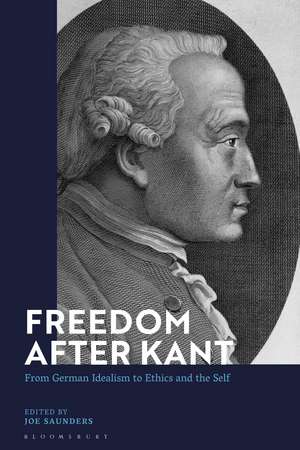Freedom After Kant: From German Idealism to Ethics and the Self
Editat de Dr Joe Saundersen Limba Engleză Hardback – 17 mai 2023
Preț: 510.42 lei
Preț vechi: 731.21 lei
-30% Nou
Puncte Express: 766
Preț estimativ în valută:
97.70€ • 106.16$ • 82.12£
97.70€ • 106.16$ • 82.12£
Carte tipărită la comandă
Livrare economică 21 aprilie-05 mai
Livrare express 14-20 martie pentru 119.32 lei
Preluare comenzi: 021 569.72.76
Specificații
ISBN-13: 9781350187757
ISBN-10: 1350187755
Pagini: 232
Dimensiuni: 156 x 234 x 25 mm
Greutate: 0.5 kg
Editura: Bloomsbury Publishing
Colecția Bloomsbury Academic
Locul publicării:London, United Kingdom
ISBN-10: 1350187755
Pagini: 232
Dimensiuni: 156 x 234 x 25 mm
Greutate: 0.5 kg
Editura: Bloomsbury Publishing
Colecția Bloomsbury Academic
Locul publicării:London, United Kingdom
Caracteristici
Situates Kant's work on freedom in relation to other seminal philosophers of the period, encompassing followers and critics alike, from Hegel and Marx to Beauvoir and Murdoch
Notă biografică
Joe Saunders is Assistant Professor in Philosophy, Durham University, UK. He is the author of numerous articles on Kant and two co-edited books, Media Ethics, Free Speech, and the Requirements of Democracy (2019) and Wellbeing Economics: The Capabilities Approach to Prosperity (2018).
Cuprins
AcknowledgementsIntroduction, Joe Saunders (Durham University, UK) PART I. The 18th Century: Kant and his Contemporaries; Freedom and Normativity 1. Freedom, Radical Evil and Ought Implies Can: A Problem for Kant, Robert Stern (University of Sheffield, UK)2. Reinhold on Free Will and Moral Obligation: A Kantian Response, Jochen Bojanowski (University of Illinois, USA)3. Kant and the Fate of Freedom: 1788-1800, Owen Ware (University of Toronto, Canada)4. Fichte on Self-Sufficiency and Teleology, Gabriel Gottlieb (Xavier University, USA) PART II. The 19th Century: The post-Kantians, Idealists and Pragmatists; Nature, Politics and Experience 5. The Feeling of Freedom: Schelling on the Role of Freedom in Grasping Nature, Dalia Nassar (University of Sydney, Australia)6. Is Autonomy sufficient for Freedom?, Charlotte Alderwick (University of the West of England Bristol, UK)7. Freedom and Hegel's Theory of the State, Christoph Schuringa (New College of the Humanities, UK)8. 'In and Through their Association': Freedom and Communism in Marx, Jan Kandiyali (LSE, UK) and Andrew Chitty (University of Sussex, UK)9. Mill on Freedom, Normativity, and Spontaneity, Christopher Macleod (University of Lancaster, UK)10. Practical Grounds for Freedom: Kant and James on Freedom, Experience, and an Open Future, Joe Saunders (Durham University, UK) and Neil Williams (University of Roehampton, UK) PART III. The 20th Century: New Developments: Freedom, The Self, and Others 11. Levinas and "Finite Freedom", James Lewis (University of Birmingham, UK) and Simon Thornton (University of Sheffield, UK):12. Rethinking Existentialism: From Radical Freedom to Sedimentation, Jon Webber (University of Cardiff, UK)13. 'Murdoch on Freedom', Ana Barandalla (The Aga Khan University)Index
Recenzii
The essays in this collection trace the emergence and expression of Kant's own conception of freedom, its criticism and appropriation by his contemporaries, and its lasting influence on European philosophy. They are of uniformly high quality, and make important contributions to our understanding of this essential idea.
This outstanding collection of essays examines the rich legacy of Kant's conception of freedom in an impressive range of thinkers, from the German Idealists to Sartre, de Beauvoir and Murdoch. It is a very welcome contribution to the important ongoing debate about freedom, normativity and our relations to others.
This collection of exceptional essays on responses to Kant in his immediate successors, in German idealism, and in utilitarianism, pragmatism, and existentialism, focused on the issues of freedom, normativity, and their relations, is a major step in the neglected study of the influence of Kant's moral philosophy between his time and our own.
This important volume brings together essays from expert and emerging scholars around an enduring philosophical question: how should we understand freedom in the wake of Kant's groundbreaking contributions to the topic? Taking up questions surrounding the relation between freedom and normativity from Kant and post-Kantian philosophy to existentialism and beyond, this collection is a valuable resource for students and scholars interested in thinking through the problem of freedom in a post-Enlightenment world.
This is a timely book offering new perspectives on freedom after Kant. The book is particularly remarkable for its range (from Kant and the post-Kantians to existentialist thinkers) and for the diversity of its contributors (authorities in their field but also younger scholars). I learned a lot from reading it.
This outstanding collection of essays examines the rich legacy of Kant's conception of freedom in an impressive range of thinkers, from the German Idealists to Sartre, de Beauvoir and Murdoch. It is a very welcome contribution to the important ongoing debate about freedom, normativity and our relations to others.
This collection of exceptional essays on responses to Kant in his immediate successors, in German idealism, and in utilitarianism, pragmatism, and existentialism, focused on the issues of freedom, normativity, and their relations, is a major step in the neglected study of the influence of Kant's moral philosophy between his time and our own.
This important volume brings together essays from expert and emerging scholars around an enduring philosophical question: how should we understand freedom in the wake of Kant's groundbreaking contributions to the topic? Taking up questions surrounding the relation between freedom and normativity from Kant and post-Kantian philosophy to existentialism and beyond, this collection is a valuable resource for students and scholars interested in thinking through the problem of freedom in a post-Enlightenment world.
This is a timely book offering new perspectives on freedom after Kant. The book is particularly remarkable for its range (from Kant and the post-Kantians to existentialist thinkers) and for the diversity of its contributors (authorities in their field but also younger scholars). I learned a lot from reading it.
